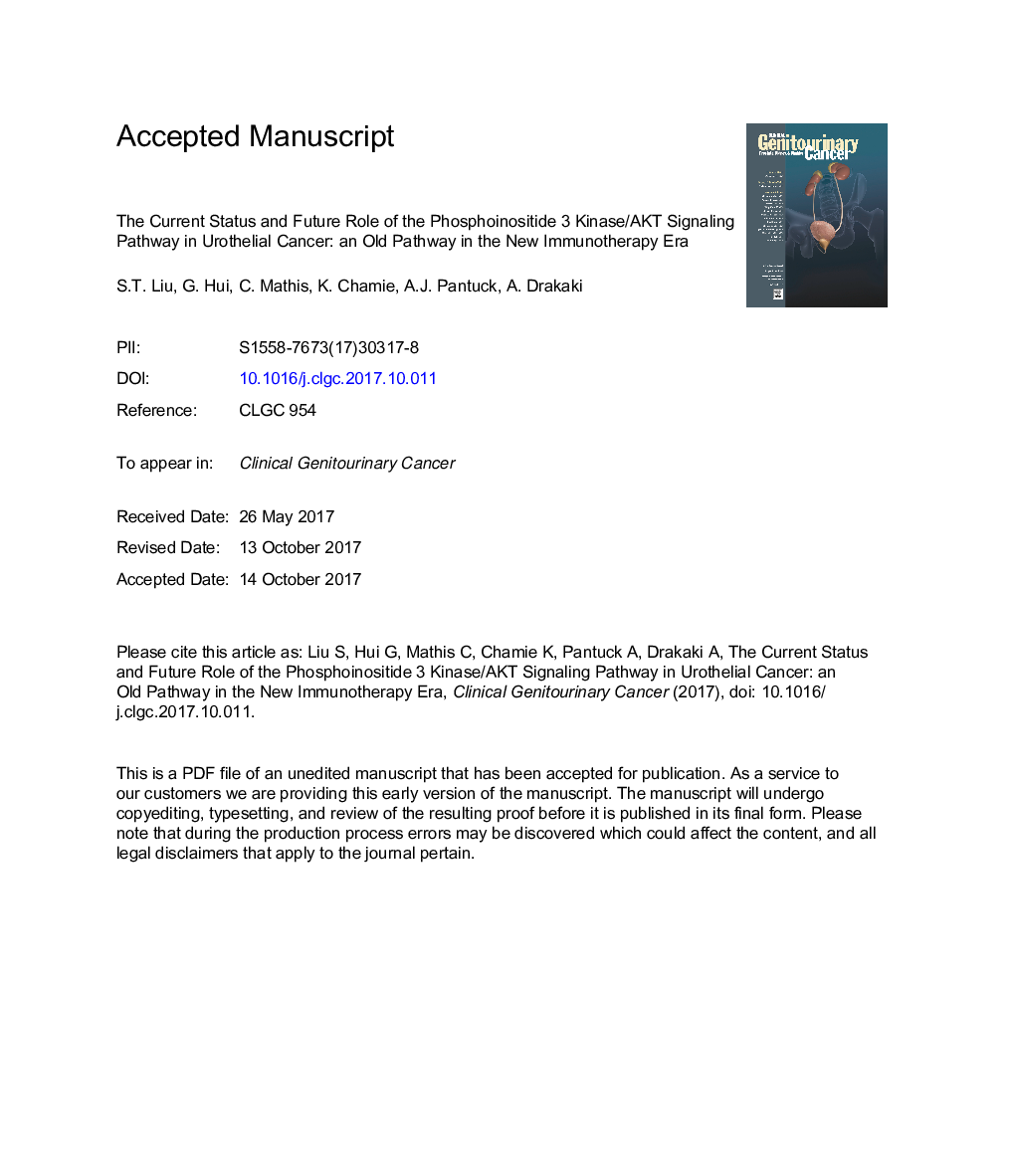| کد مقاله | کد نشریه | سال انتشار | مقاله انگلیسی | نسخه تمام متن |
|---|---|---|---|---|
| 8613840 | 1567334 | 2018 | 18 صفحه PDF | دانلود رایگان |
عنوان انگلیسی مقاله ISI
The Current Status and Future Role of the Phosphoinositide 3 Kinase/AKT Signaling Pathway in Urothelial Cancer: An Old Pathway in the New Immunotherapy Era
دانلود مقاله + سفارش ترجمه
دانلود مقاله ISI انگلیسی
رایگان برای ایرانیان
کلمات کلیدی
موضوعات مرتبط
علوم پزشکی و سلامت
پزشکی و دندانپزشکی
بیهوشی و پزشکی درد
پیش نمایش صفحه اول مقاله

چکیده انگلیسی
The phosphoinositide 3 kinase (PI3K)/protein kinase B (AKT)/mammalian target of rapamycin (mTOR) pathway is a well studied signaling pathway that regulates diverse cellular functions including proliferation, metabolism, and transcription. Aberrant activation of this pathway has been implicated in multiple cancers. Genomic studies have shown that activating mutations in oncogenes as well as inactivating mutations in tumor suppressor genes are present across a variety of malignancies, including urothelial carcinoma. In bladder cancer, up to 40% of tumors exhibit constitutive activation of the PI3K/AKT/mTOR pathway. Current treatments for non-muscle-invasive disease confer a 5-year cancer-specific survival rate as high as 90%. However, patients with muscle-invasive, recurrent, or metastatic disease have a poor prognosis. Although the introduction of immune checkpoint inhibitors is certainly changing the therapeutic landscape and is a great addition to the platinum-based therapy that was the standard of care for the past 3 decades, it is anticipated that a great number of patients would fail to respond or their disease would progress with either chemotherapy or immunotherapy. Therefore, the use of agents that target members of the PI3K/AKT/mTOR pathway represent an attractive, alternative therapeutic strategy for patients with advanced urothelial carcinoma. In this review we describe the pathway, with a focus on the rationale for targeting the PI3K/AKT/mTOR pathway in patients with advanced urothelial carcinoma and considers the challenges that we face from the current clinical trials. Novel agents such as PI3K inhibitors and microRNA inhibitors that target this pathway might lead to durable responses especially when used in combination with chemotherapy or immune checkpoint inhibitors, however, toxicity remains an obstacle. Finally, in this review we discuss the importance of developing biomarkers to help select appropriate patients and identify optimal treatment options.
ناشر
Database: Elsevier - ScienceDirect (ساینس دایرکت)
Journal: Clinical Genitourinary Cancer - Volume 16, Issue 2, April 2018, Pages e269-e276
Journal: Clinical Genitourinary Cancer - Volume 16, Issue 2, April 2018, Pages e269-e276
نویسندگان
Sandy T. Liu, Gavin Hui, Colleen Mathis, Karim Chamie, Allan J. Pantuck, Alexandra Drakaki,